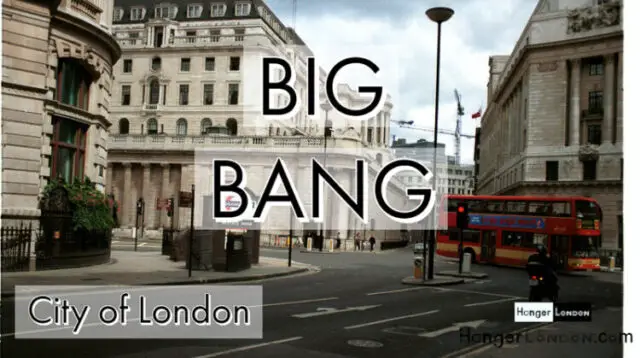1986 – the sudden deregulation of the financial markets
On the 27th October 1986, the London Stock Exchange rules changed, the day was forever known as ‘Big Bang’ Expectation of increased market activity. The origins of the change due to an agreement to settle a long-running antitrust case by the Office of Fair Trading against the London Stock Exchange. The investigation was into restrictive practices, fixed commissions, the separation of duties between market makers and brokers and traders.
An agreement was reached between Thatchers Government and the London Stock Exchange to settle, 3 years later the day arrived ‘Big Bang’ in the financial heart of London. The changes had far-reaching implications, many of the smaller London firms were taken over by larger banking firms. The creation of the Financial Services authority – later to change again.
The outcome of the Big Bang was dramatic, the cornerstone of Thatcher’s reform programme. London’s place as a financial capital was strengthened. decades later London became home to literally some of the biggest banking institutions in the world.
Why was the big Bang Necessary
Before the Big Bang, the London Stock Exchange was a closed and elitist institution, dominated by a small group of brokers who controlled the market. This made it difficult for new entrants to compete and limited the types of financial instruments that could be traded. The Big Bang was necessary to modernize the market and make it more open and competitive.
Part 3: What were the main changes introduced by the Big Bang?
The Big Bang introduced a number of important changes to the London Stock Exchange. First, it allowed for electronic trading, which made it easier and faster for traders to buy and sell securities. Second, it abolished fixed commission rates, which made trading more competitive and lowered costs for investors. Third, it allowed for new types of financial instruments to be traded, such as options and futures.
Part 4: What was the impact of the Big Bang?
The impact of the Big Bang was profound. It transformed the London Stock Exchange from a closed and elitist institution to a more open and competitive market. It also made it easier for investors to trade securities and lowered costs for them. The Big Bang was seen as a major milestone in the history of finance and has had a lasting impact on the global financial system.
Part 5: What lessons can we learn from the Big Bang?
The Big Bang provides a number of important lessons for investors and policymakers. First, it shows the importance of innovation and modernisation in financial markets. Second, it highlights the benefits of competition and open markets. Third, it underscores the need for regulation to ensure that markets remain fair and transparent. Overall, the Big Bang was a landmark event that reshaped the financial world and continues to influence it today.




